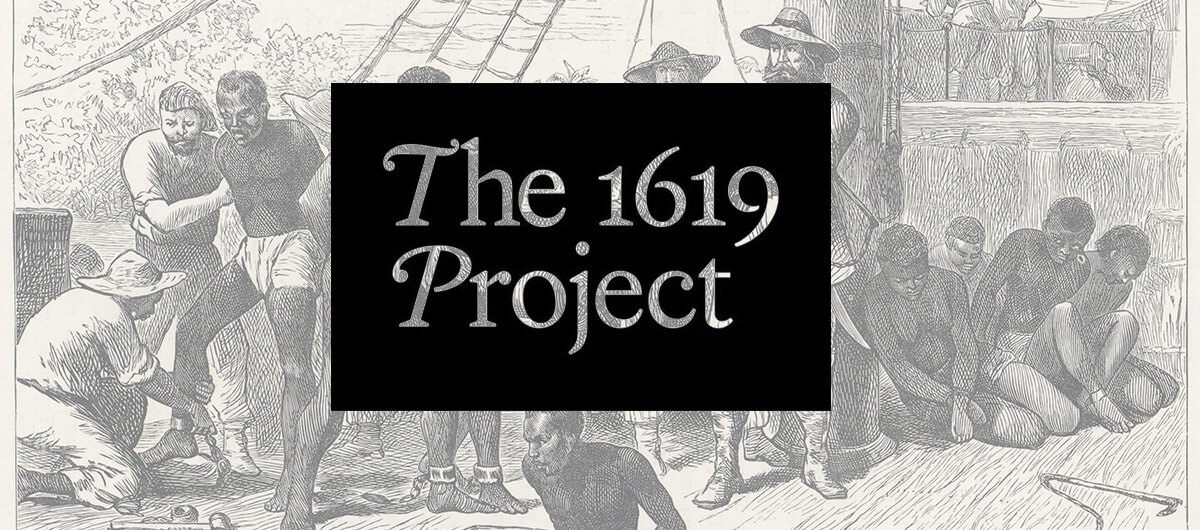

American Identity
Democracy Shrouded In Lies Isn’t Democracy
The 1619 Project and the new book, 'How to Be an Antiracist,' are reminders that American history is incomplete until we resurrect and reconcile its brutal truth. And freedom will be out of reach until we do.
This article was made possible because of the generous support of DAME members. We urgently need your help to keep publishing. Will you contribute just $5 a month to support our journalism?
I’ve been on or in front of hundreds of theatrical stages throughout my life as a student of theater, as a playwright, and as a performer. In that time, I’ve been drawn to American playwrights like August Wilson, Lorraine Hansberry, and Suzan-Lori Parks who expose truths about this country many are afraid to confront outside the comfort of a dimly lit theatre. In the past two weeks, I’ve attended two onstage events at two different venues where I’ve been challenged to confront truths about this country that needed to be exposed in the light of day. On these stages, my direction came not from playwrights, but historians.
America’s history of slavery and the antidote of antiracist policy are the truths I encountered at TheTimesCenter for the unveiling of The 1619 Project and the Judson Memorial Church for the launch of Dr. Ibram Kendi’s new book, How to Be an Antiracist.

While my background is in the theater, I’m also a voting rights advocate—being an artist is political. The “reason for being” for many artists is to examine inequity, the plight of others, and our own struggles, instincts, and insight into stories that are rooted in or extracting truth.
Both of the presentations I experienced this week offered critical, sobering, and empowering narratives that strip away all pretense of our American Story. The 1619 Project, the brainchild of Nikole Hannah-Jones, a civil-rights historian and investigative reporter for The New York Times Magazine, reframes how we examine and discuss the lasting legacy of slavery, an American disease that has continued to metastasize long after the Emancipation Proclamation, Reconstruction, and the Civil Rights Act of 1964.
Dr. Ibram X. Kendi, National Book Award–winner and director of the Antiracist Research & Policy Center presented his new book How to Be an Antiracist, which provides antidotes for slavery’s lasting inequities through self-critique and crystalized definitions that lead us to antiracist policies. Dr. Kendi explains, “Definitions anchor us in principals … Some of my most consequential steps toward being an antiracist have been the moments when I arrived at basic definitions.”
Dr. Kendi and Hannah-Jones give us an opportunity to create a “more perfect union” through the implementation of their work. The 1619 Project is asking all Americans to see the truth in our country’s genesis: We became the most financially powerful nation on Earth due to the enslavement of Black people, and have continued to profit off of the disenfranchisement of Black and brown communities. Dr. Kendi parallels that axiom by asking us to investigate our own participation in racist ideas: Have we internalized racist ideas? Are we producing racist ideas? Are we repeating racist ideas? The book examines policies that are racist and anti-racist. Kendi states, “there are no race-neutral policies.” There are only antiracist policies or racist policies. “Racism is a powerful collection of racist policies that lead to racial inequity and are substantiated by racist ideas. Antiracism is a powerful collection of antiracist policies that lead to racial equity and are substantiated by antiracist ideas.”
Any exploration into a system that is created “by white men for white men,” as Jefferson Davis stated in 1870, will garner backlash. It took no time for Newt Gingrich, a man who has said, “there’s no evidence at all that Trump is a racist” (except, might I add, for almost every single policy Trump proposes, word he says, and action he does, but I digress) to clumsily tweet, “The NY Times 1619 Project should make its slogan ‘All the Propaganda we want to brainwash you with’ it is a repudiation of the original NY Times motto.” It doesn’t take a psychologist to recognize the denial and fear that lie beneath Gingrich’s tweet.
Nikole Hannah-Jones’s The 1619 Project and Dr. Ibram X Kendi’s How to Be an Antiracist give us the language to challenge and dismantle hierarchical constructs. Gingrich and others with similar mindsets interpret the challenging of hierarchy as a threat that sparks fear in right-wing spaces.
Those who retaliate against projects like 1619 and How to Be an Antiracist may not be as threatened by the truths the projects expose as they are by the empowerment given to those marginalized. Each calls out a damaging myth that White America has clung to like the American Eagle clings to its olive branch, “We are the world’s greatest democracy,” as former Speaker Paul Ryan and countless others have said and believed. Nikole Hannah-Jones dispels this negligent myth by arguing, “We were founded not as a democracy, but as a slaveocracy. A country run and ruled by slave owners.”
Slavery and its repercussions have never truly ended in America. The racist policy of slavery financed our independence from England, built our economy, and metastasized through the Civil War. When the 13th Amendment was ratified in 1865 it seemed that triage had finally been administered now that it was unconstitutional to enslave anyone on this soil.
Instead, the 13th Amendment had a massive loophole in its text: “Neither slavery nor involuntary servitude, except as a punishment for crime whereof the party shall have been duly convicted, shall exist within the United States, or any place subject to their jurisdiction.”
This loophole gave rise to racist ideas that would attempt to justify the mass incarceration of African Americans. The Nixon Administration’s Southern Strategy and ‘Law and Order’ rhetoric planted the seeds of mass incarceration by unjustifiably demonizing Black Americans as lawless. Reagan’s ‘War on Drugs’ would double the Black population in state and federal prisons. This population would skyrocket into the stratosphere under George Bush, Bill Clinton, and George W. Bush’s administration.
It wasn’t until the Obama administration that the federal prison population would start to decline. However, in 2013 the Shelby County v. Holder ruling allowed voting rights to be disproportionately stripped away from Black and other marginalized voters. It is clear there is an unending mission to diminish Black American’s political power.
Nikole Hannah-Jones, standing stage left under the spotlight, stood flinty behind the podium, just before her words ignited us all “Enslaved African people took the founding documents of this country and its words literally … Black people responded to their enslavement by demanding and fighting not just for their own rights but for universal rights … It is Black people that have fought more than any other group to make the ideals laid out in the constitution a reality.”
Black Americans are the “perfectors” and protectors of American democracy.
While The 1619 Project asks us to look at our racist policies and the pernicious effect they have on our present, Dr. Kendi looks forward beseeching us to move out of our own shadows of denial. Sitting just above us on stage, microphone in hand with an intricate stained-glass window behind him, Dr. Kendi exclaimed, “In order for America to survive, America has to stop denying that it has metastatic racism. If the heartbeat of racism is denial then the heartbeat of anti-racism is confession … acknowledging, recognizing, and literally confessing the ways in which we are being racist. The racist ideas that we have consumed over a lifetime, the racist power structure” and “polices we have supported that we didn’t necessarily know were racist policies but … supported … anyway.” This self-reflection “is essential in engaging on the journey of anti-racism.” He was like a skilled thespian delivering a monologue, the room hung on each and every one of his words.
Reflecting on my own work as a voting-rights advocate and artist, I’ll admit that I am daunted by the obstacles in our way and blistered by an elected opposition whose self-interest looks to strengthen racist policies that continuously set the majority of us adrift. In theatre, we’re always asked, “what is your motivation to overcome those obstacles?” In this case, for me, it’s the desire to have a truly functioning democracy something that seems perilously in danger with each passing day.
How to Be an Antiracist and The 1619 Project should spark a conversation if not a clarion call for all of us to excavate our stories that have been buried, to find what has been lost, and see that our history is present and in plain sight. These works ask us to be not only self-reflective, but also self-critical. Advocating for anti-racist policies and ideas is a continuous journey that doesn’t end with any one election. It is work that must be continued each passing day. All of us have a place to make our contribution in this struggle. That contribution can be on stage or off, either way, there are obstacles, let’s all find our motivation to overcome them.
Before you go, we hope you’ll consider supporting DAME’s journalism.
Today, just tiny number of corporations and billionaire owners are in control the news we watch and read. That influence shapes our culture and our understanding of the world. But at DAME, we serve as a counterbalance by doing things differently. We’re reader funded, which means our only agenda is to serve our readers. No both sides, no false equivalencies, no billionaire interests. Just our mission to publish the information and reporting that help you navigate the most complex issues we face.
But to keep publishing, stay independent and paywall free for all, we urgently need more support. During our Spring Membership drive, we hope you’ll join the community helping to build a more equitable media landscape with a monthly membership of just $5.00 per month or one-time gift in any amount.
















































































